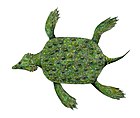远古龙属 - 维基百科,自由的百科全书
| 远古龙属 化石时期:晚白垩世, | |
|---|---|
| 凯氏远古龙的复原图 | |
| 科学分类 | |
| 界: | 动物界 Animalia |
| 门: | 脊索动物门 Chordata |
| 纲: | 爬行綱 Reptilia |
| 目: | †蛇頸龍目 Plesiosauria |
| 科: | †薄板龙科 Elasmosauridae |
| 属: | †远古龙属 Tuarangisaurus Wiffen & Moisley, 1986 |
| 模式種 | |
| †凯氏远古龙 Tuarangisaurus keyesi Wiffen & Moisley, 1986 | |
远古龙(学名:Tuarangisaurus,毛利語:tuarangi[古代的] + 希臘語:σαῦρος,羅馬化:sauros[蜥蜴])是薄板龙科已灭绝的一个属,化石发现于新西兰。模式种兼唯一已知物种是凯氏远古龙(Tuarangisaurus keyesi),由威芬和莫伊斯利于1986年命名。[1][2]
发现
[编辑]
已知化石包括正模标本NZGS CD425,含有几乎完整的颅骨及下颌骨——及NZGS CD426,含前九节颈椎。一些幼龙颅后遗骸亦归入远古龙,其中一件标本(NZGS CD427)含有至少30颗胃石。[1]其收集于塔霍拉组曼加塔尼瓦砂岩段(Maungataniwha Sandstone Member),时间为晚白垩世坎帕阶晚期至马斯特里赫特阶早期。[2]
第二个种澳洲远古龙(T. australis)于2005年命名,[3]但于2007年移入新属伊罗曼加龙,成为嵴颌伊罗曼加龙(E. carinognathus)的首异名。[4]第三个种卡氏远古龙(T.? cabazai)在原始描述中亦归入本属,[1]但近期被重新归为分类不明的极泳龙亚科。[5]
2017年,一件原属毛伊龙的完整标本(CM Zfr 115)被重新归入该属,[6]2018年,奥特罗等人报告了一具幼龙标本,表明了这种蛇颈龙的个体发育。该标本具有很多与正模标本相同的特征,但上颌骨方向及牙齿数目存在差异。[7]
描述
[编辑]远古龙是种中型蛇颈龙,完整标本(CM Zfr 115)长度测为超过8米(26英尺)。[8]颅骨保存部分长度测为37.0厘米(1英尺2.6英寸)左右,完整长度估计为37.5厘米(1英尺2.8英寸)。[1]该属可根据一个独特的特征组合及两项此前未知的特征,与所有其它薄板龙科区分开来:外翼骨有一个朝向背侧的细长突起,下侧有一大型骨质突起。正模标本中存在一个镫骨,此前认为薄板龙科不具有这种骨骼。[2][9]
分类
[编辑]远古龙最初被归入薄板龙科,[1]一项研究发现其为卡拉瓦亚龙的近亲。[10]奥戈曼等人2016年的系统发育分析再次确认其属于薄板龙科,但否认其与卡拉瓦亚龙近缘。根据分析,该属在薄板龙科中的位置如下。[2]
| 薄板龙科 Elasmosauridae |
| |||||||||||||||||||||||||||||||||||||||||||||||||||||||||||||||||||||||||||||||||||||||||||||
参见
[编辑]参考资料
[编辑]- ^ 1.0 1.1 1.2 1.3 1.4 Wiffen, J.; Moisley, W.L. Late Cretaceous reptiles (Families Elasmosauridae and Pliosauridae) from the Mangahouanga Stream, North Island, New Zealand. New Zealand Journal of Geology and Geophysics. 1986, 29 (2): 205–252. Bibcode:1986NZJGG..29..205W. doi:10.1080/00288306.1986.10427535.
- ^ 2.0 2.1 2.2 2.3 O'Gorman, J.P.; Otero, R.A.; Hiller, N.; Simes, J.; Terezow, M. Redescription of Tuarangisaurus keyesi (Sauropterygia; Elasmosauridae), a key species from the uppermost Cretaceous of the Weddellian Province: Internal skull anatomy and phylogenetic position. Cretaceous Research. 2016, 71: 118–136. doi:10.1016/j.cretres.2016.11.014.
- ^ Sachs, S. Tuarangisaurus australis sp. nov. (Plesiosauria: Elasmosauridae) from the Lower Cretaceous of northeastern Queensland, with additional notes on the phylogeny of the Elasmosauridae (PDF). Memoirs of the Queensland Museum. 2005, 50 (2): 425–440. (原始内容 (PDF)存档于2011-09-28).
- ^ Benjamin P. Kear. Taxonomic clarification of the Australian elasmosaurid genus Eromangasaurus, with reference to other austral elasmosaur taxa. Journal of Vertebrate Paleontology. 2007, 27 (1): 241–246. S2CID 86673814. doi:10.1671/0272-4634(2007)27[241:TCOTAE]2.0.CO;2.
- ^ O'Gorman, J.P.; Gasparini, Z.; Salgado, L. Reappraisal of Tuarangisaurus? cabazai (Elasmosauridae, Plesiosauria) from the Upper Maastrichtian of northern Patagonia, Argentina. Cretaceous Research. 2014, 47: 39–47. Bibcode:2014CrRes..47...39O. doi:10.1016/j.cretres.2013.10.003. hdl:11336/37287
 .
. - ^ Hiller, Norton; O'Gorman, José P.; Otero, Rodrigo A.; Mannering, Al A. A reappraisal of the Late Cretaceous Weddellian plesiosaur genus Mauisaurus Hector, 1874. New Zealand Journal of Geology and Geophysics. 2017, 60 (2): 112–128. Bibcode:2017NZJGG..60..112H. S2CID 132037930. doi:10.1080/00288306.2017.1281317.
- ^ Otero, R.A.; O'Gorman, J.P.; Moisley, W.L.; Terezow, M.; Mckee, J. A juvenile Tuarangisaurus keyesi Wiffen and Moisley, 1986 (Plesiosauria, Elasmosauridae) from the Upper Cretaceous of New Zealand, with Remarks on Its Skull Ontogeny. Cretaceous Research. 2018, 85: 214–231. Bibcode:2018CrRes..85..214O. doi:10.1016/j.cretres.2017.09.007. hdl:11336/99631
 .
. - ^ O'Gorman, J.P. A Small Body Sized Non-Aristonectine Elasmosaurid (Sauropterygia, Plesiosauria) from the Late Cretaceous of Patagonia with Comments on the Relationships of the Patagonian and Antarctic Elasmosaurids. Ameghiniana. 2016, 53 (3): 245–268. S2CID 133139689. doi:10.5710/AMGH.29.11.2015.2928.
- ^ Carpenter, K. Revision of North American elasmosaurs from the Cretaceous of the western interior. Paludicola. 1999, 2: 148–173.
- ^ Kubo, T.; Mitchell, M.T.; Henderson, D.M. Albertonectes vanderveldei, a new elasmosaur (Reptilia, Sauropterygia) from the Upper Cretaceous of Alberta. Journal of Vertebrate Paleontology. 2012, 32 (3): 557–572. Bibcode:2012JVPal..32..557K. S2CID 129500470. doi:10.1080/02724634.2012.658124.


 French
French Deutsch
Deutsch





